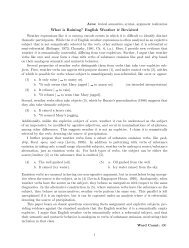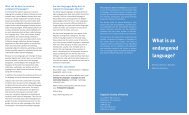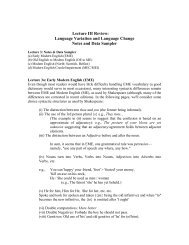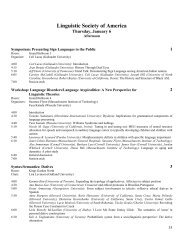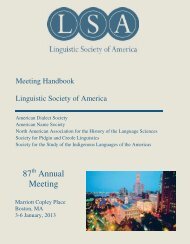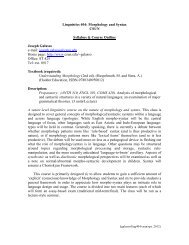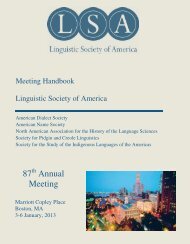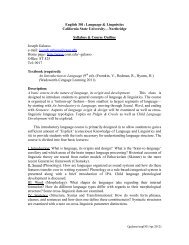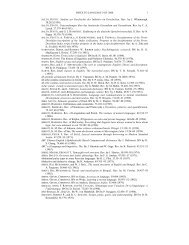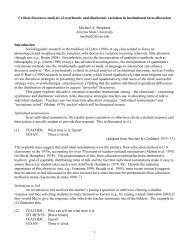Linda Abarbanell (Harvard University) Session 10<strong>Linguistic</strong> flexibility in frame <strong>of</strong> reference use among adult Tseltal (Mayan) speakersTseltal is known for its absence <strong>of</strong> left-right (egocentric) coordinates for describing spatial relations. Instead, speakers use <strong>the</strong> uphilldownhill(geocentric) slope <strong>of</strong> <strong>the</strong>ir terrain. Tseltal has left-right body-part terms; however, <strong>the</strong>se are not extended to regions <strong>of</strong> spaceoutside <strong>the</strong> body. In a series <strong>of</strong> language-elicitation tasks, I examine whe<strong>the</strong>r Tseltal-speakers can extend <strong>the</strong>ir available left-rightterms for use in spatial reference. While spontaneous left-right extensions were rare, Tseltal-speakers were quite capable <strong>of</strong>comprehending and producing left-right spatial descriptions. Moreover, <strong>the</strong> conversational structure <strong>of</strong> <strong>the</strong> tasks suggests that <strong>the</strong>habits <strong>of</strong> a language community are open to interlocutor influence.Sayaka Abe (University at Buffalo-SUNY) Session 10‘True & ‘pseudo-‘ subjectification <strong>of</strong> <strong>the</strong> Japanese completion marker -shimauI approach subjectification diachronically. First, I distinguish two types <strong>of</strong> subjectification: (1) speaker-internal subjectification,which is driven by <strong>the</strong> speaker's presence in <strong>the</strong> sentence, and (2) speaker-external subjectification, which is driven by <strong>the</strong> speaker'sabsence from <strong>the</strong> sentence. Based on observations <strong>of</strong> semantic change <strong>of</strong> <strong>the</strong> Japanese marker, -shimau (grammaticalized from shimau'put away, finish'), I show <strong>the</strong> asymmetry between <strong>the</strong> two types <strong>of</strong> subjectification and argue that (1) is associated with limited andidiosyncratic development, i.e., ‘pseudo-‘ subjectification, while (2) leads to relatively stable and regular development in asemasiological change, i.e., ‘true’ subjectification.Lois Ann Abraham (<strong>America</strong>n River C) Session 68Hemingway's thingamajig"Hills Like White Elephants" by Ernest Hemingway uses a name for only one <strong>of</strong> <strong>the</strong> characters in <strong>the</strong> short story. I investigate <strong>the</strong>possible meanings <strong>of</strong> <strong>the</strong> name Jig and connect <strong>the</strong>se meanings to various <strong>the</strong>mes <strong>of</strong> <strong>the</strong> work. I show my interpretation <strong>of</strong> naming inthis short story to be consistent with Hemingway's philosophy and practice <strong>of</strong> writing.Marta Abrusan (Massachusetts Institute <strong>of</strong> Technology) Session 17Even & free choice any in HungarianI present an analysis <strong>of</strong> Hungarian free choice indefinites. Hungarian FCIs are composed <strong>of</strong> a special type <strong>of</strong> focus particle, akár‘even’ which itself has a free-choice-like distribution, and <strong>of</strong> a wh-indefinite. I argue that akár ‘even’ is composed <strong>of</strong> even plus anexhaustive operator (Exh). As <strong>the</strong> additive presupposition <strong>of</strong> even and <strong>the</strong> lexical import <strong>of</strong> Exh are contradictory, this combinationresults in ungrammaticality, unless a suitable operator intervenes. In <strong>the</strong> second part <strong>of</strong> <strong>the</strong> paper, I show that <strong>the</strong> core distribution <strong>of</strong>free choice indefinites in Hungarian simply follows from <strong>the</strong> meaning <strong>of</strong> <strong>the</strong> incorporated akear.Michael Adams (Indiana U) Session 75Assimilation <strong>of</strong> French-Canadian names into New England speech: Notes from a Vermont cemeteryHeadstones in St. Mary's Cemetery, Middlebury, VT, preserve some 450 surnames. Many are English, Scots, or Scotch-Irish inorigin, some are exotic, but at least 110 <strong>of</strong> <strong>the</strong>m are Canadian French in origin. These numbers are rough; some <strong>of</strong> <strong>the</strong> names areplausibly related to some o<strong>the</strong>rs, contemporaneous variants or successive forms <strong>of</strong> <strong>the</strong> same name. Everything French became Englishwithin <strong>the</strong> second and third generations after settlement. I outline phonological patterns <strong>of</strong> accommodation, Canadian French into<strong>America</strong>n English, as well as telling exceptions that toge<strong>the</strong>r reflect <strong>the</strong> community's very <strong>America</strong>n history.Dany Adone (University <strong>of</strong> Cologne) Session 82Christiane Bongartz (University <strong>of</strong> Cologne)‘Sally go shopping’: Grammaticalization in second language acquisition & creole formationIn creole studies and second language acquisition research <strong>the</strong>re is a current debate about grammaticalization. In creole genesis itrefers to <strong>the</strong> change from lexical items to syntax. In second language acquisition grammaticalisation is involved in <strong>the</strong> transition fromearly learner varieties to sophisticated varieties. We argue that structural similarities between creole languages and second languagelearners' varieties are easily accounted for by <strong>the</strong> process <strong>of</strong> grammaticalization. Unlike creole speakers, learner varieties reflectindividual psychological states. Data from immersion classrooms show that <strong>the</strong>se individual states overlap substantially. This overlapconstitutes evidence that learner grammars and creoles are psycholinguistically similar.97
Brian Agbayani (California State University, Fresno) Session 39Masao Ochi (Osaka University)Split lexical insertion in parasitic gap constructionsWe propose to extend <strong>the</strong> feature movement <strong>the</strong>ory (Chomsky 1995, Lasnik 1999, Agbayani 2006, Agbayani & Ochi 2006) byclaiming that <strong>the</strong> separation <strong>of</strong> formal features (FF) from <strong>the</strong> rest <strong>of</strong> a lexical item (LI) occurs not only in syntactic movement but alsoin <strong>the</strong> course <strong>of</strong> lexical insertion. Applying this hypo<strong>the</strong>sis to parasitic gap (PG) constructions, we argue that <strong>the</strong> FF and <strong>the</strong> rest <strong>of</strong> <strong>the</strong>LI are merged into <strong>the</strong> PG site and <strong>the</strong> real gap site, respectively. Our analysis straightforwardly explains among o<strong>the</strong>r things <strong>the</strong> S-structure licensing requirement on PG and <strong>the</strong> reconstruction asymmetry found with PG.Jocelyn Ahlers (California State University, San Marcos) Session 103Borrowing in Elem PomoI explore <strong>the</strong> layers <strong>of</strong> borrowings found in Elem (Sou<strong>the</strong>astern) Pomo, a Pomoan language spoken near Clear Lake, CA. Theseborrowings have come from two main linguistic sources: Sou<strong>the</strong>rn Wintun, an unrelated language spoken in close proximity to <strong>the</strong>traditional lands <strong>of</strong> <strong>the</strong> Elem Pomo, and Spanish. Borrowings from English into Elem are relatively rare. Each set <strong>of</strong> borrowingsshows particular phonological and semantic patterning, both <strong>of</strong> which reflect <strong>the</strong> age <strong>of</strong> <strong>the</strong> borrowings and <strong>the</strong> social setting withinwhich such borrowings occurred. Data are drawn both from current fieldwork with one <strong>of</strong> <strong>the</strong> last two speakers <strong>of</strong> <strong>the</strong> language, andfrom extant documentation.Rizwan Ahmad (University <strong>of</strong> Michigan) Session 30Old wine in a new bottle: Urdu in NagariAnalyzing data from Urdu in Devanagari, I show how speakers <strong>of</strong> Urdu, a language traditionally written in <strong>the</strong> Persian script, afteradopting Devanagari, are innovating graphemic strategies to mark Urdu in Devanagari as distinct from Hindi. I argue that <strong>the</strong>innovation is in response to a potential threat that <strong>the</strong> adoption <strong>of</strong> Devanagari poses to <strong>the</strong> independent identity <strong>of</strong> Urdu as a languagedifferent from Hindi. I fur<strong>the</strong>r argue that <strong>the</strong> phenomenon <strong>of</strong> writing Urdu in Devanagari both initiates and at <strong>the</strong> same time reinforcesa change in <strong>the</strong> indexical value <strong>of</strong> Nagari as emblematic <strong>of</strong> Hindu identity.Farid Alakbarli (Azerbaijan National Academy <strong>of</strong> Sciences) Session 74Edwin D. Lawson (State University <strong>of</strong> New York, Fredonia, Emeritus)Richard F. Shell (State University <strong>of</strong> New York, Fredonia, Emeritus)Azeri names: Meaning & pronunciation on <strong>the</strong> webThis is a demonstration <strong>of</strong> an audio slide show on <strong>the</strong> web, featuring <strong>the</strong> language derivation, meaning, pronunciation, and frequency<strong>of</strong> more than 400 given names from Azerbaijan. A native speaker pronounces each name clearly. The pronunciation key for eachname shows The New York Times style as well as IPA (http://www.fredonia.edu/faculty/emeritus/EdwinLawson/azerinames/).Asier Alcázar (University <strong>of</strong> Sou<strong>the</strong>rn California) Session 20Mario Saltarelli (University <strong>of</strong> Sou<strong>the</strong>rn California)Zanuttini's Hypo<strong>the</strong>sis: Participial constructions revisitedZanuttini's hypo<strong>the</strong>sis claims <strong>the</strong>re exists a selectional relation between tense and sentential negation, such that if T, <strong>the</strong>n Neg(Zanuttini 1996:181). This hypo<strong>the</strong>sis rests on evidence from Romance command forms and absolute participial constructions.However, Italian absolutes <strong>of</strong> <strong>the</strong> Medieval and Renaissance periods admit negation (Egerland 1996:204). We report a similar patternfor Basque. Basque and Old Italian absolutes are not predicted under Zanuttini's Hypo<strong>the</strong>sis because in <strong>the</strong>se constructions Negmerges to v*P in lieu <strong>of</strong> TP. These facts invite fur<strong>the</strong>r research into why certain forms <strong>of</strong> commands cannot be negated and intoselectional restrictions more generally.Daniel Altshuler (Rutgers University) Session 56Simultaneous readings in non-SOT languagesI present a novel hypo<strong>the</strong>sis about <strong>the</strong> interpretation <strong>of</strong> tense: All languages have simultaneous readings in Past-under-Pastattitude/speech reports. I present data from Russian, Hebrew, and Japanese and argue that <strong>the</strong> generally held 'non-SOT' status <strong>of</strong> <strong>the</strong>selanguages is misleading. Although <strong>the</strong>ories which posit a syntactic SOT rule and vacuous tense morphology can account for <strong>the</strong>sedata with a simple parameter setting, I follow Gennari (2003) in concluding that such <strong>the</strong>ories overgenerate; a <strong>the</strong>ory <strong>of</strong> embeddedtense must address <strong>the</strong> fact that aspect and reference/topic time specification play a crucial role in allowing simultaneous readingscross-linguistically.98
- Page 1:
MEETING HANDBOOKLINGUISTIC SOCIETY
- Page 5 and 6:
Meeting RoomsSECOND FLOORFOURTH FLO
- Page 7:
• LSA: Business Meeting and Award
- Page 11 and 12:
LSAThursday, 4 JanuaryEveningWelcom
- Page 13 and 14:
Friday MorningLSAConstructions and
- Page 15 and 16:
LSAFriday, 5 JanuaryAfternoonInvite
- Page 17 and 18:
Friday AfternoonLSAModeling Acquisi
- Page 19 and 20:
LSARules for Motions and Resolution
- Page 24 and 25:
LSASaturday AfternoonSymposium: Par
- Page 26 and 27:
LSASaturday AfternoonSyntactic Face
- Page 28 and 29:
LSASunday MorningFirst Language Acq
- Page 30 and 31: American Dialect SocietyThursday, 4
- Page 32 and 33: ADSSaturday, 6 JanuaryMorningSessio
- Page 34 and 35: American Name SocietyThursday, 4 Ja
- Page 36 and 37: ANSFriday AfternoonForms of Address
- Page 38 and 39: ANSSaturday AfternoonHistorical Ono
- Page 40 and 41: Society for Pidgin and Creole Lingu
- Page 42 and 43: SPCLSaturday, 6 JanuaryMorningSpeci
- Page 44 and 45: Society for the Study of the Indige
- Page 46 and 47: SSILAFriday AfternoonPhonology and
- Page 48 and 49: SSILASunday, 7 JanuaryMorningSemant
- Page 50 and 51: Part 1: Thursday, 4 JanuaryPart 2:
- Page 52 and 53: Donca Steriade (Massachusetts Insti
- Page 54 and 55: Friday, 5 JanuaryPlenary AddressCal
- Page 56: Saturday, 6 JanuaryPresidential Add
- Page 59 and 60: Thursday, 4 JanuaryTutorialA Field
- Page 61 and 62: Thursday, 4 JanuarySymposiumContinu
- Page 63 and 64: Friday, 5 JanuarySymposiumApproache
- Page 65 and 66: Friday, 5 JanuaryDigital Poster Ses
- Page 67 and 68: Stephen R. Anderson (Yale Universit
- Page 69 and 70: David Bowie (University of Central
- Page 71 and 72: Sharon Peperkamp (CNRS/University o
- Page 73 and 74: Elena Guerzoni (University of South
- Page 75 and 76: Claire Bowern (Rice University)Morp
- Page 77 and 78: Lise Dobrin (University of Virginia
- Page 79: We discuss the analysis of the vowe
- Page 83 and 84: squiggly shapes). Disfluency made n
- Page 85 and 86: Adam Baker (University of Arizona)
- Page 87 and 88: final particle; this structure enco
- Page 89 and 90: Travis G. Bradley (University of Ca
- Page 91 and 92: demonstrated that 2-year-olds map n
- Page 93 and 94: Nancy J. Caplow (University of Cali
- Page 95 and 96: Sarah Churng (University of Washing
- Page 97 and 98: Jennifer Culbertson (Johns Hopkins
- Page 99 and 100: Scott Drellishak (University of Was
- Page 101 and 102: Marc Ettlinger (University of Calif
- Page 103 and 104: Scherre 2001 argue that the phenome
- Page 105 and 106: Cynthia A. Fox (University at Alban
- Page 107 and 108: structures to the double object con
- Page 109 and 110: Steven Gross (East Tennessee State
- Page 111 and 112: Heidi Harley (University of Arizona
- Page 113 and 114: equivalents. I argue that their sim
- Page 115 and 116: predictable, and/or restricted in d
- Page 117 and 118: Keith Johnson (University of Arizon
- Page 119 and 120: Andrew Kehler (University of Califo
- Page 121 and 122: comparative rate of acquisition acr
- Page 123 and 124: Pei-Jung Kuo (University of Connect
- Page 125 and 126: EunHee Lee (University at Buffalo,
- Page 127 and 128: Brook Danielle Lillehaugen (Univers
- Page 129 and 130: Martha J. Macri (University of Cali
- Page 131 and 132:
Spanish subjects with unaccusative
- Page 133 and 134:
Brad Montgomery-Anderson (Universit
- Page 135 and 136:
multi-ethnic configuration, and pos
- Page 137 and 138:
Natalie Operstein (University of Ca
- Page 139 and 140:
Nick Pharris (University of Michiga
- Page 141 and 142:
Anastasia Riehl (Cornell University
- Page 143 and 144:
Françoise Rose (CNRS-IRD) Session
- Page 145 and 146:
precedence also constrains stative
- Page 147 and 148:
use experimental and corpus techniq
- Page 149 and 150:
eads easily for astrophysicists.).
- Page 151 and 152:
domains of use are mostly complemen
- Page 153 and 154:
show that both concatenative and no
- Page 155 and 156:
Don Walicek (University of Puerto R
- Page 157 and 158:
positions. However, certain matrix
- Page 159 and 160:
Suwon Yoon (University of Chicago)



